Entrepreneurship: Venture Typology and Economic Impact Analysis
VerifiedAdded on 2021/02/22
|12
|3670
|131
Report
AI Summary
This report provides a detailed analysis of entrepreneurship and small business management, covering various types of entrepreneurial ventures such as public, private, social, corporate, and academic entrepreneurship, highlighting their similarities and differences. It interprets data and statistics to demonstrate the significant impact of micro and small businesses on the economic condition, particularly in the UK, emphasizing their role in employment, tax contributions, and GDP growth. The report also underscores the importance of small businesses and startups in fostering social economy growth, discussing the characteristic traits and skills of successful entrepreneurs, such as motivation, risk-taking, creativity, and versatility, that differentiate them from business managers. Furthermore, it touches upon how background and experience can either hinder or foster entrepreneurship, providing a comprehensive overview of the entrepreneurial landscape. Desklib offers similar solved assignments for students.

Entrepreneurship and
Small Business
Management
Small Business
Management
Paraphrase This Document
Need a fresh take? Get an instant paraphrase of this document with our AI Paraphraser
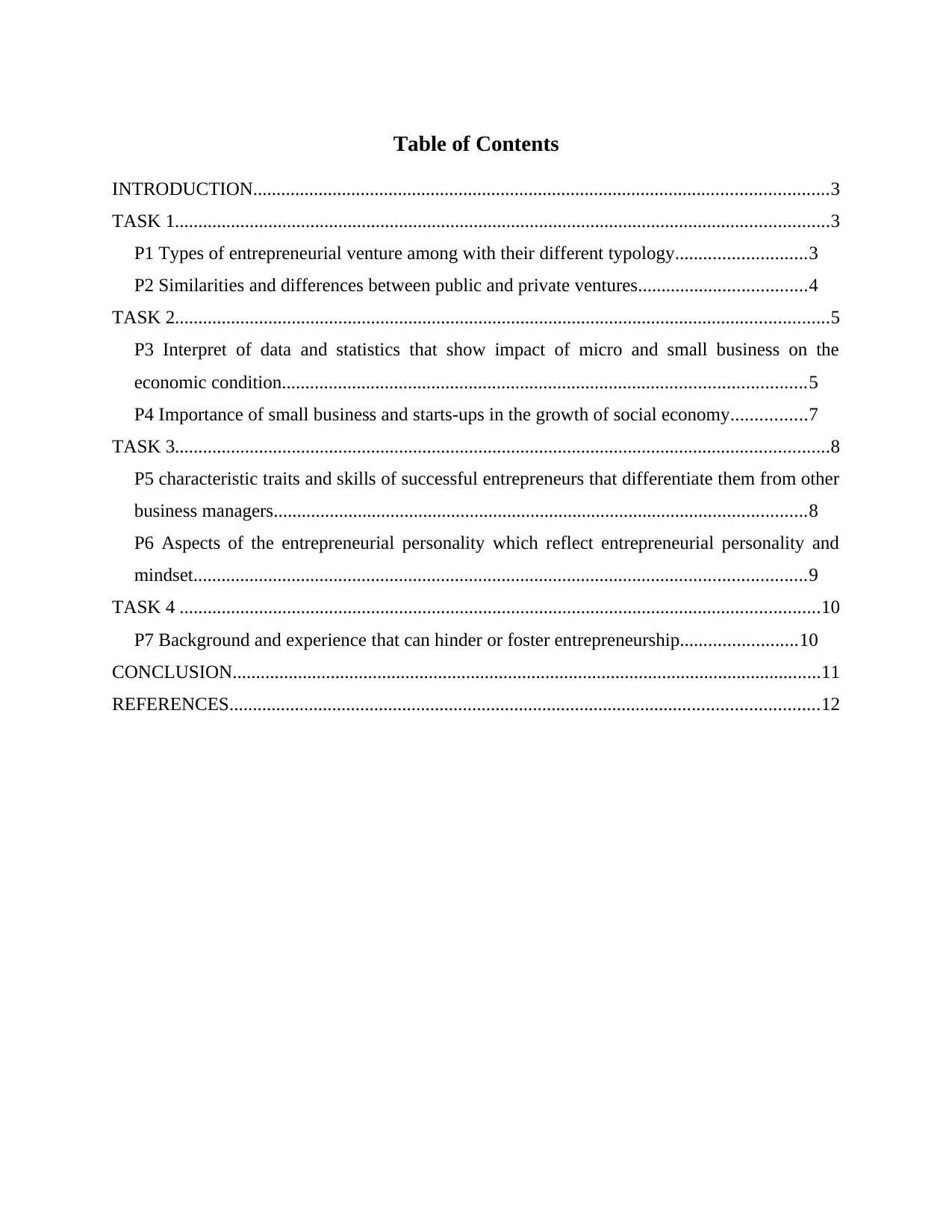
Table of Contents
INTRODUCTION...........................................................................................................................3
TASK 1............................................................................................................................................3
P1 Types of entrepreneurial venture among with their different typology............................3
P2 Similarities and differences between public and private ventures....................................4
TASK 2............................................................................................................................................5
P3 Interpret of data and statistics that show impact of micro and small business on the
economic condition................................................................................................................5
P4 Importance of small business and starts-ups in the growth of social economy................7
TASK 3............................................................................................................................................8
P5 characteristic traits and skills of successful entrepreneurs that differentiate them from other
business managers..................................................................................................................8
P6 Aspects of the entrepreneurial personality which reflect entrepreneurial personality and
mindset...................................................................................................................................9
TASK 4 .........................................................................................................................................10
P7 Background and experience that can hinder or foster entrepreneurship.........................10
CONCLUSION..............................................................................................................................11
REFERENCES..............................................................................................................................12
INTRODUCTION...........................................................................................................................3
TASK 1............................................................................................................................................3
P1 Types of entrepreneurial venture among with their different typology............................3
P2 Similarities and differences between public and private ventures....................................4
TASK 2............................................................................................................................................5
P3 Interpret of data and statistics that show impact of micro and small business on the
economic condition................................................................................................................5
P4 Importance of small business and starts-ups in the growth of social economy................7
TASK 3............................................................................................................................................8
P5 characteristic traits and skills of successful entrepreneurs that differentiate them from other
business managers..................................................................................................................8
P6 Aspects of the entrepreneurial personality which reflect entrepreneurial personality and
mindset...................................................................................................................................9
TASK 4 .........................................................................................................................................10
P7 Background and experience that can hinder or foster entrepreneurship.........................10
CONCLUSION..............................................................................................................................11
REFERENCES..............................................................................................................................12
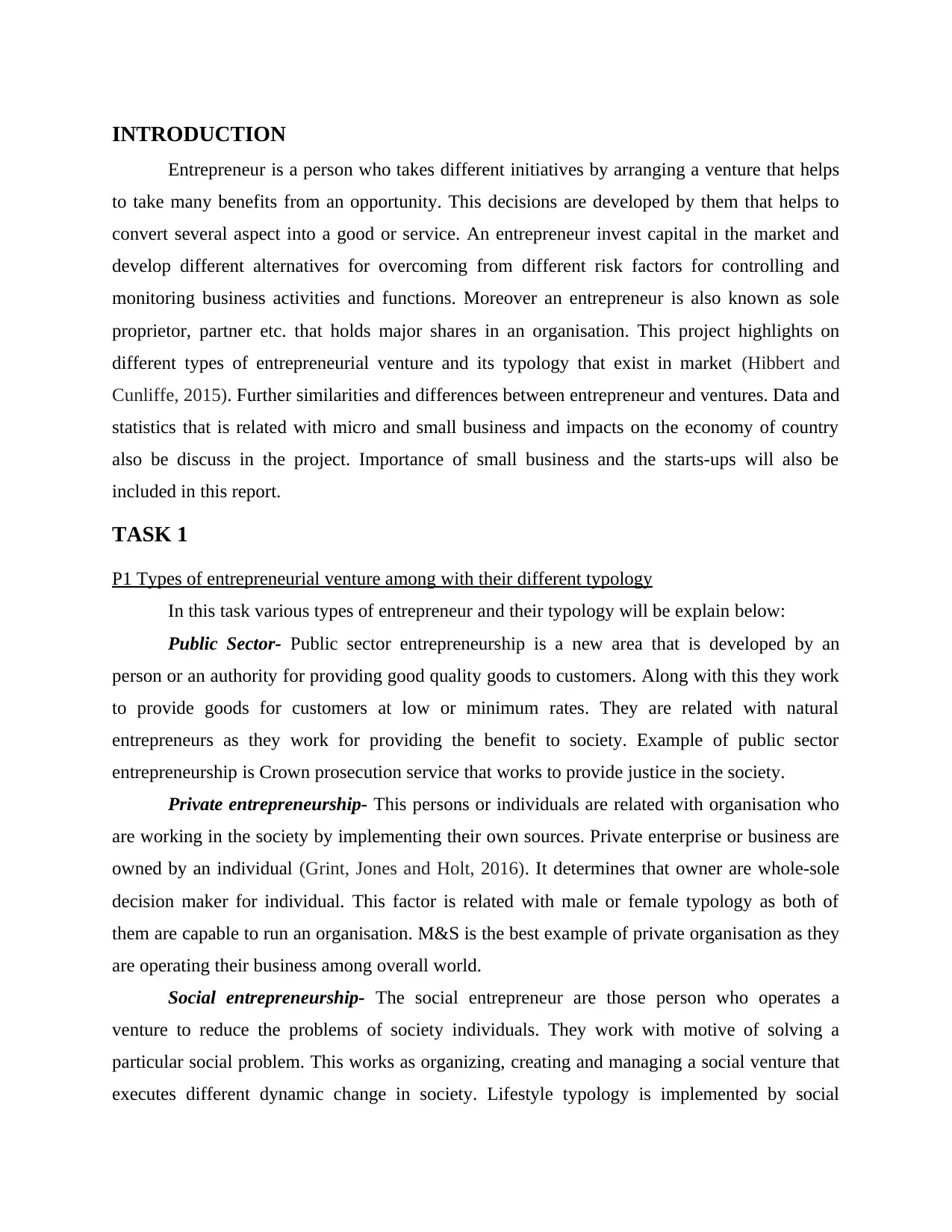
INTRODUCTION
Entrepreneur is a person who takes different initiatives by arranging a venture that helps
to take many benefits from an opportunity. This decisions are developed by them that helps to
convert several aspect into a good or service. An entrepreneur invest capital in the market and
develop different alternatives for overcoming from different risk factors for controlling and
monitoring business activities and functions. Moreover an entrepreneur is also known as sole
proprietor, partner etc. that holds major shares in an organisation. This project highlights on
different types of entrepreneurial venture and its typology that exist in market (Hibbert and
Cunliffe, 2015). Further similarities and differences between entrepreneur and ventures. Data and
statistics that is related with micro and small business and impacts on the economy of country
also be discuss in the project. Importance of small business and the starts-ups will also be
included in this report.
TASK 1
P1 Types of entrepreneurial venture among with their different typology
In this task various types of entrepreneur and their typology will be explain below:
Public Sector- Public sector entrepreneurship is a new area that is developed by an
person or an authority for providing good quality goods to customers. Along with this they work
to provide goods for customers at low or minimum rates. They are related with natural
entrepreneurs as they work for providing the benefit to society. Example of public sector
entrepreneurship is Crown prosecution service that works to provide justice in the society.
Private entrepreneurship- This persons or individuals are related with organisation who
are working in the society by implementing their own sources. Private enterprise or business are
owned by an individual (Grint, Jones and Holt, 2016). It determines that owner are whole-sole
decision maker for individual. This factor is related with male or female typology as both of
them are capable to run an organisation. M&S is the best example of private organisation as they
are operating their business among overall world.
Social entrepreneurship- The social entrepreneur are those person who operates a
venture to reduce the problems of society individuals. They work with motive of solving a
particular social problem. This works as organizing, creating and managing a social venture that
executes different dynamic change in society. Lifestyle typology is implemented by social
Entrepreneur is a person who takes different initiatives by arranging a venture that helps
to take many benefits from an opportunity. This decisions are developed by them that helps to
convert several aspect into a good or service. An entrepreneur invest capital in the market and
develop different alternatives for overcoming from different risk factors for controlling and
monitoring business activities and functions. Moreover an entrepreneur is also known as sole
proprietor, partner etc. that holds major shares in an organisation. This project highlights on
different types of entrepreneurial venture and its typology that exist in market (Hibbert and
Cunliffe, 2015). Further similarities and differences between entrepreneur and ventures. Data and
statistics that is related with micro and small business and impacts on the economy of country
also be discuss in the project. Importance of small business and the starts-ups will also be
included in this report.
TASK 1
P1 Types of entrepreneurial venture among with their different typology
In this task various types of entrepreneur and their typology will be explain below:
Public Sector- Public sector entrepreneurship is a new area that is developed by an
person or an authority for providing good quality goods to customers. Along with this they work
to provide goods for customers at low or minimum rates. They are related with natural
entrepreneurs as they work for providing the benefit to society. Example of public sector
entrepreneurship is Crown prosecution service that works to provide justice in the society.
Private entrepreneurship- This persons or individuals are related with organisation who
are working in the society by implementing their own sources. Private enterprise or business are
owned by an individual (Grint, Jones and Holt, 2016). It determines that owner are whole-sole
decision maker for individual. This factor is related with male or female typology as both of
them are capable to run an organisation. M&S is the best example of private organisation as they
are operating their business among overall world.
Social entrepreneurship- The social entrepreneur are those person who operates a
venture to reduce the problems of society individuals. They work with motive of solving a
particular social problem. This works as organizing, creating and managing a social venture that
executes different dynamic change in society. Lifestyle typology is implemented by social
⊘ This is a preview!⊘
Do you want full access?
Subscribe today to unlock all pages.

Trusted by 1+ million students worldwide
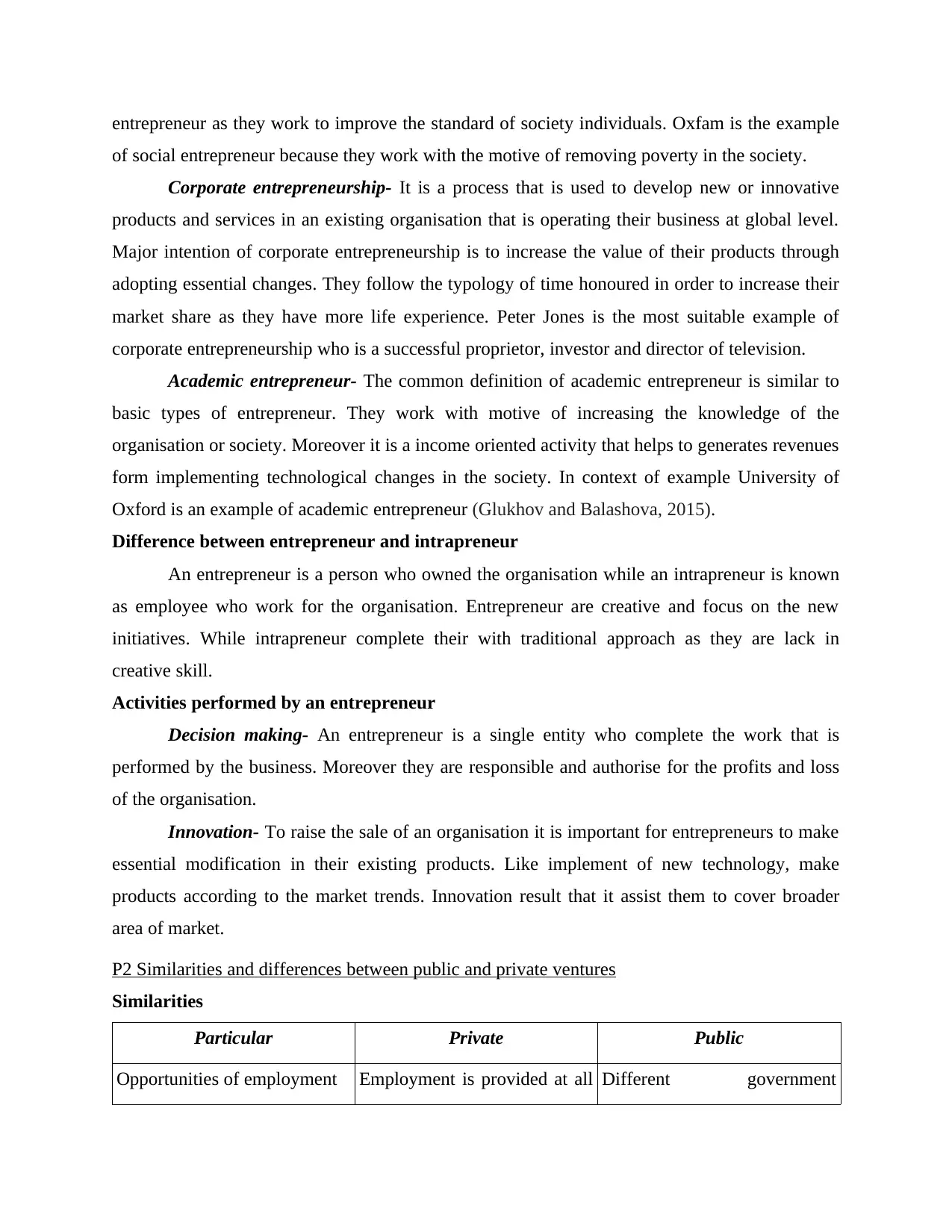
entrepreneur as they work to improve the standard of society individuals. Oxfam is the example
of social entrepreneur because they work with the motive of removing poverty in the society.
Corporate entrepreneurship- It is a process that is used to develop new or innovative
products and services in an existing organisation that is operating their business at global level.
Major intention of corporate entrepreneurship is to increase the value of their products through
adopting essential changes. They follow the typology of time honoured in order to increase their
market share as they have more life experience. Peter Jones is the most suitable example of
corporate entrepreneurship who is a successful proprietor, investor and director of television.
Academic entrepreneur- The common definition of academic entrepreneur is similar to
basic types of entrepreneur. They work with motive of increasing the knowledge of the
organisation or society. Moreover it is a income oriented activity that helps to generates revenues
form implementing technological changes in the society. In context of example University of
Oxford is an example of academic entrepreneur (Glukhov and Balashova, 2015).
Difference between entrepreneur and intrapreneur
An entrepreneur is a person who owned the organisation while an intrapreneur is known
as employee who work for the organisation. Entrepreneur are creative and focus on the new
initiatives. While intrapreneur complete their with traditional approach as they are lack in
creative skill.
Activities performed by an entrepreneur
Decision making- An entrepreneur is a single entity who complete the work that is
performed by the business. Moreover they are responsible and authorise for the profits and loss
of the organisation.
Innovation- To raise the sale of an organisation it is important for entrepreneurs to make
essential modification in their existing products. Like implement of new technology, make
products according to the market trends. Innovation result that it assist them to cover broader
area of market.
P2 Similarities and differences between public and private ventures
Similarities
Particular Private Public
Opportunities of employment Employment is provided at all Different government
of social entrepreneur because they work with the motive of removing poverty in the society.
Corporate entrepreneurship- It is a process that is used to develop new or innovative
products and services in an existing organisation that is operating their business at global level.
Major intention of corporate entrepreneurship is to increase the value of their products through
adopting essential changes. They follow the typology of time honoured in order to increase their
market share as they have more life experience. Peter Jones is the most suitable example of
corporate entrepreneurship who is a successful proprietor, investor and director of television.
Academic entrepreneur- The common definition of academic entrepreneur is similar to
basic types of entrepreneur. They work with motive of increasing the knowledge of the
organisation or society. Moreover it is a income oriented activity that helps to generates revenues
form implementing technological changes in the society. In context of example University of
Oxford is an example of academic entrepreneur (Glukhov and Balashova, 2015).
Difference between entrepreneur and intrapreneur
An entrepreneur is a person who owned the organisation while an intrapreneur is known
as employee who work for the organisation. Entrepreneur are creative and focus on the new
initiatives. While intrapreneur complete their with traditional approach as they are lack in
creative skill.
Activities performed by an entrepreneur
Decision making- An entrepreneur is a single entity who complete the work that is
performed by the business. Moreover they are responsible and authorise for the profits and loss
of the organisation.
Innovation- To raise the sale of an organisation it is important for entrepreneurs to make
essential modification in their existing products. Like implement of new technology, make
products according to the market trends. Innovation result that it assist them to cover broader
area of market.
P2 Similarities and differences between public and private ventures
Similarities
Particular Private Public
Opportunities of employment Employment is provided at all Different government
Paraphrase This Document
Need a fresh take? Get an instant paraphrase of this document with our AI Paraphraser
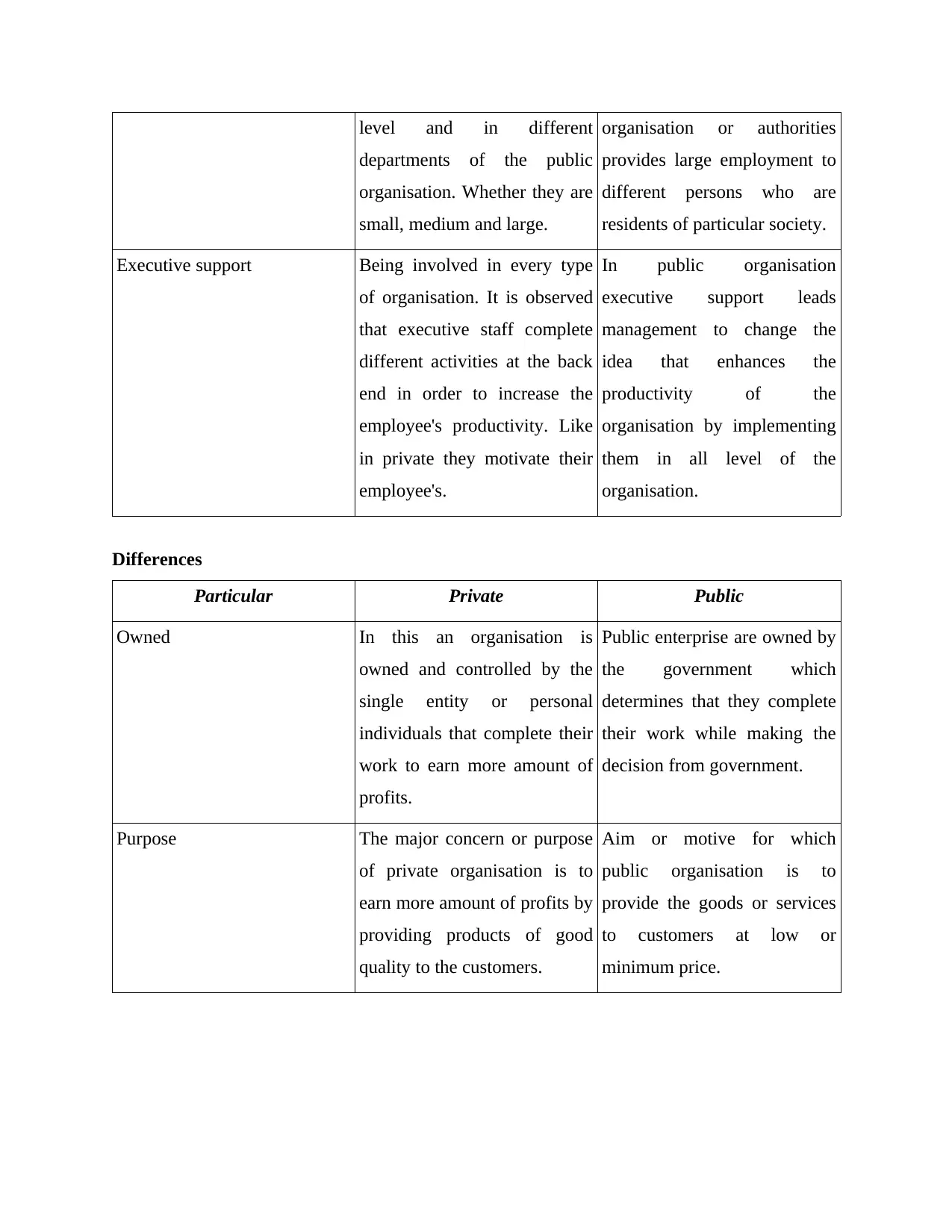
level and in different
departments of the public
organisation. Whether they are
small, medium and large.
organisation or authorities
provides large employment to
different persons who are
residents of particular society.
Executive support Being involved in every type
of organisation. It is observed
that executive staff complete
different activities at the back
end in order to increase the
employee's productivity. Like
in private they motivate their
employee's.
In public organisation
executive support leads
management to change the
idea that enhances the
productivity of the
organisation by implementing
them in all level of the
organisation.
Differences
Particular Private Public
Owned In this an organisation is
owned and controlled by the
single entity or personal
individuals that complete their
work to earn more amount of
profits.
Public enterprise are owned by
the government which
determines that they complete
their work while making the
decision from government.
Purpose The major concern or purpose
of private organisation is to
earn more amount of profits by
providing products of good
quality to the customers.
Aim or motive for which
public organisation is to
provide the goods or services
to customers at low or
minimum price.
departments of the public
organisation. Whether they are
small, medium and large.
organisation or authorities
provides large employment to
different persons who are
residents of particular society.
Executive support Being involved in every type
of organisation. It is observed
that executive staff complete
different activities at the back
end in order to increase the
employee's productivity. Like
in private they motivate their
employee's.
In public organisation
executive support leads
management to change the
idea that enhances the
productivity of the
organisation by implementing
them in all level of the
organisation.
Differences
Particular Private Public
Owned In this an organisation is
owned and controlled by the
single entity or personal
individuals that complete their
work to earn more amount of
profits.
Public enterprise are owned by
the government which
determines that they complete
their work while making the
decision from government.
Purpose The major concern or purpose
of private organisation is to
earn more amount of profits by
providing products of good
quality to the customers.
Aim or motive for which
public organisation is to
provide the goods or services
to customers at low or
minimum price.
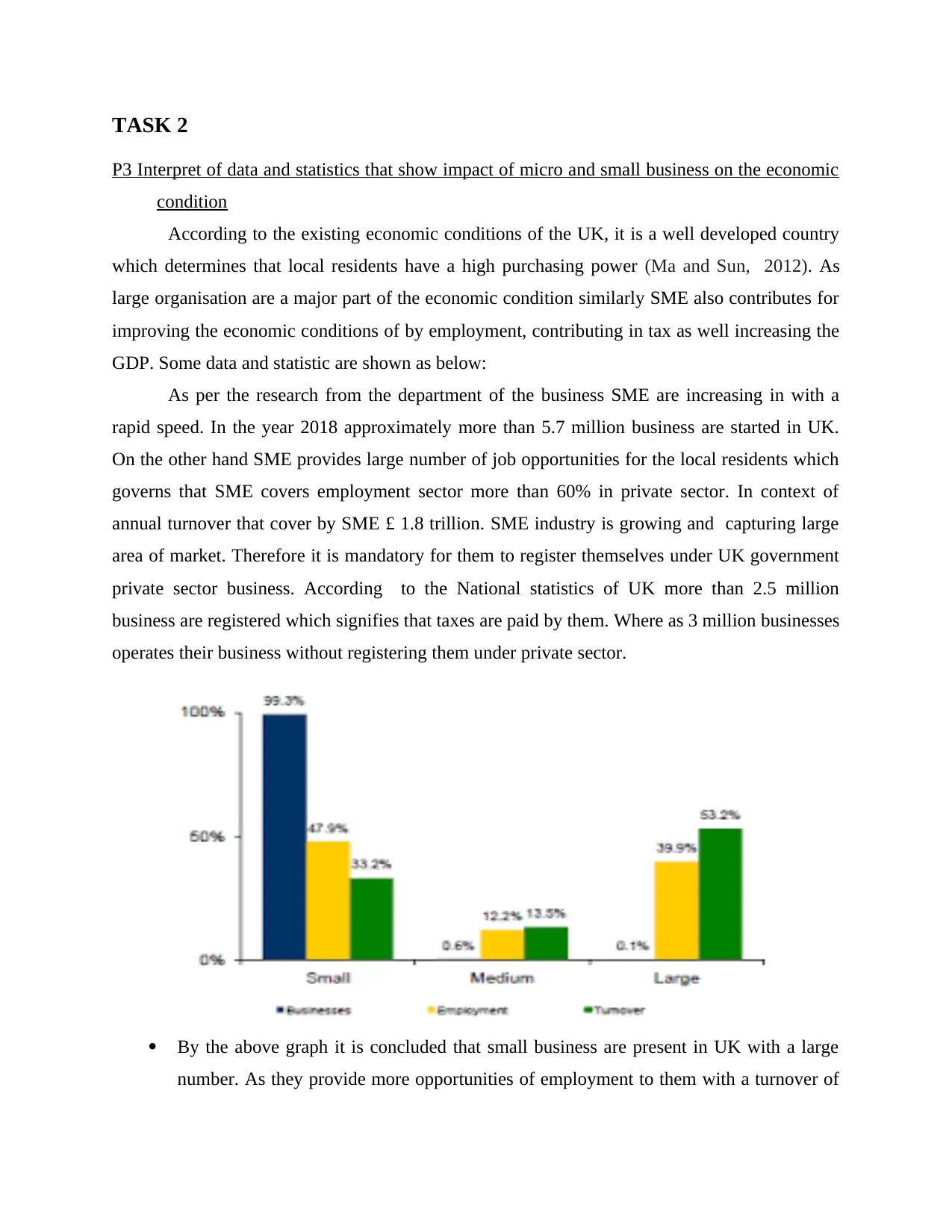
TASK 2
P3 Interpret of data and statistics that show impact of micro and small business on the economic
condition
According to the existing economic conditions of the UK, it is a well developed country
which determines that local residents have a high purchasing power (Ma and Sun, 2012). As
large organisation are a major part of the economic condition similarly SME also contributes for
improving the economic conditions of by employment, contributing in tax as well increasing the
GDP. Some data and statistic are shown as below:
As per the research from the department of the business SME are increasing in with a
rapid speed. In the year 2018 approximately more than 5.7 million business are started in UK.
On the other hand SME provides large number of job opportunities for the local residents which
governs that SME covers employment sector more than 60% in private sector. In context of
annual turnover that cover by SME £ 1.8 trillion. SME industry is growing and capturing large
area of market. Therefore it is mandatory for them to register themselves under UK government
private sector business. According to the National statistics of UK more than 2.5 million
business are registered which signifies that taxes are paid by them. Where as 3 million businesses
operates their business without registering them under private sector.
By the above graph it is concluded that small business are present in UK with a large
number. As they provide more opportunities of employment to them with a turnover of
P3 Interpret of data and statistics that show impact of micro and small business on the economic
condition
According to the existing economic conditions of the UK, it is a well developed country
which determines that local residents have a high purchasing power (Ma and Sun, 2012). As
large organisation are a major part of the economic condition similarly SME also contributes for
improving the economic conditions of by employment, contributing in tax as well increasing the
GDP. Some data and statistic are shown as below:
As per the research from the department of the business SME are increasing in with a
rapid speed. In the year 2018 approximately more than 5.7 million business are started in UK.
On the other hand SME provides large number of job opportunities for the local residents which
governs that SME covers employment sector more than 60% in private sector. In context of
annual turnover that cover by SME £ 1.8 trillion. SME industry is growing and capturing large
area of market. Therefore it is mandatory for them to register themselves under UK government
private sector business. According to the National statistics of UK more than 2.5 million
business are registered which signifies that taxes are paid by them. Where as 3 million businesses
operates their business without registering them under private sector.
By the above graph it is concluded that small business are present in UK with a large
number. As they provide more opportunities of employment to them with a turnover of
⊘ This is a preview!⊘
Do you want full access?
Subscribe today to unlock all pages.

Trusted by 1+ million students worldwide
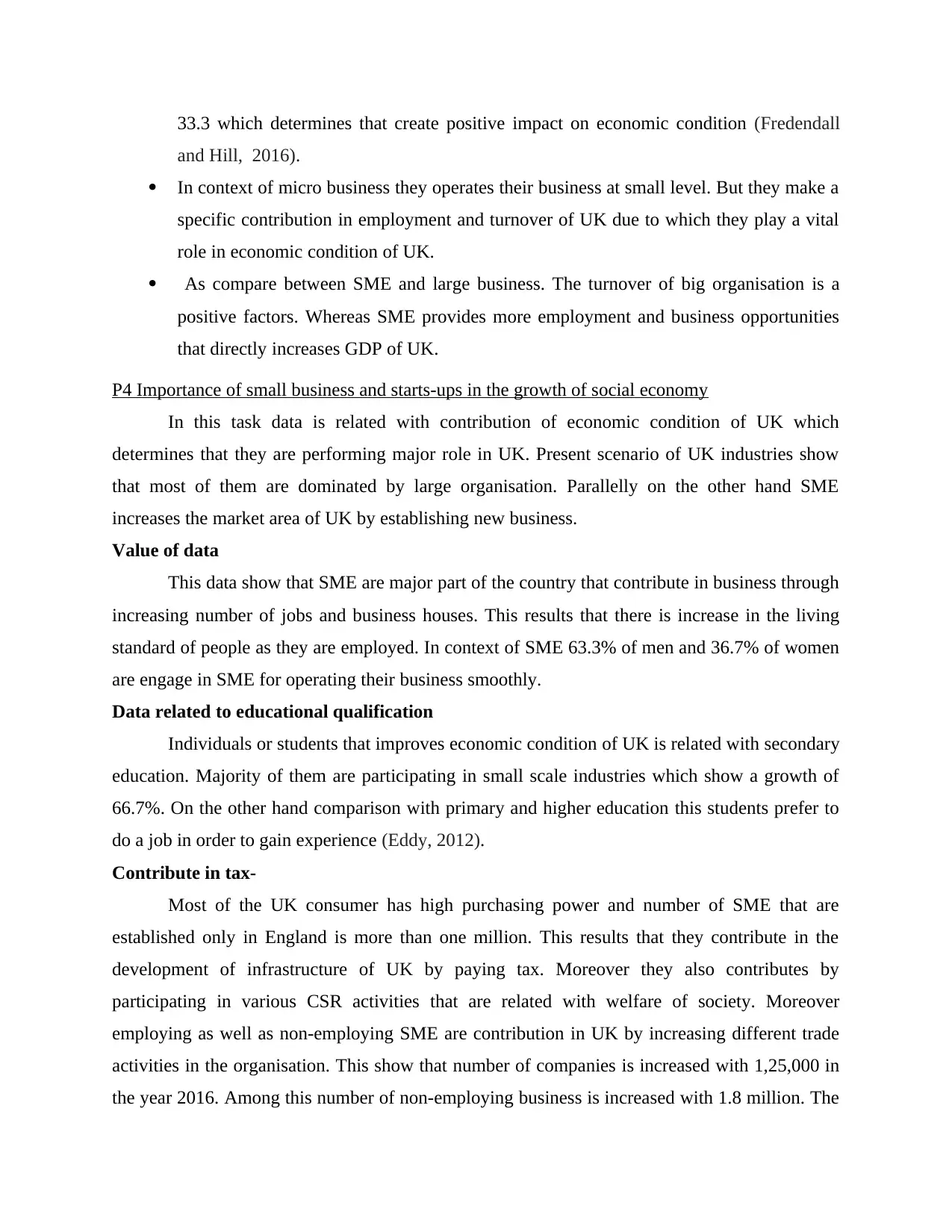
33.3 which determines that create positive impact on economic condition (Fredendall
and Hill, 2016).
In context of micro business they operates their business at small level. But they make a
specific contribution in employment and turnover of UK due to which they play a vital
role in economic condition of UK.
As compare between SME and large business. The turnover of big organisation is a
positive factors. Whereas SME provides more employment and business opportunities
that directly increases GDP of UK.
P4 Importance of small business and starts-ups in the growth of social economy
In this task data is related with contribution of economic condition of UK which
determines that they are performing major role in UK. Present scenario of UK industries show
that most of them are dominated by large organisation. Parallelly on the other hand SME
increases the market area of UK by establishing new business.
Value of data
This data show that SME are major part of the country that contribute in business through
increasing number of jobs and business houses. This results that there is increase in the living
standard of people as they are employed. In context of SME 63.3% of men and 36.7% of women
are engage in SME for operating their business smoothly.
Data related to educational qualification
Individuals or students that improves economic condition of UK is related with secondary
education. Majority of them are participating in small scale industries which show a growth of
66.7%. On the other hand comparison with primary and higher education this students prefer to
do a job in order to gain experience (Eddy, 2012).
Contribute in tax-
Most of the UK consumer has high purchasing power and number of SME that are
established only in England is more than one million. This results that they contribute in the
development of infrastructure of UK by paying tax. Moreover they also contributes by
participating in various CSR activities that are related with welfare of society. Moreover
employing as well as non-employing SME are contribution in UK by increasing different trade
activities in the organisation. This show that number of companies is increased with 1,25,000 in
the year 2016. Among this number of non-employing business is increased with 1.8 million. The
and Hill, 2016).
In context of micro business they operates their business at small level. But they make a
specific contribution in employment and turnover of UK due to which they play a vital
role in economic condition of UK.
As compare between SME and large business. The turnover of big organisation is a
positive factors. Whereas SME provides more employment and business opportunities
that directly increases GDP of UK.
P4 Importance of small business and starts-ups in the growth of social economy
In this task data is related with contribution of economic condition of UK which
determines that they are performing major role in UK. Present scenario of UK industries show
that most of them are dominated by large organisation. Parallelly on the other hand SME
increases the market area of UK by establishing new business.
Value of data
This data show that SME are major part of the country that contribute in business through
increasing number of jobs and business houses. This results that there is increase in the living
standard of people as they are employed. In context of SME 63.3% of men and 36.7% of women
are engage in SME for operating their business smoothly.
Data related to educational qualification
Individuals or students that improves economic condition of UK is related with secondary
education. Majority of them are participating in small scale industries which show a growth of
66.7%. On the other hand comparison with primary and higher education this students prefer to
do a job in order to gain experience (Eddy, 2012).
Contribute in tax-
Most of the UK consumer has high purchasing power and number of SME that are
established only in England is more than one million. This results that they contribute in the
development of infrastructure of UK by paying tax. Moreover they also contributes by
participating in various CSR activities that are related with welfare of society. Moreover
employing as well as non-employing SME are contribution in UK by increasing different trade
activities in the organisation. This show that number of companies is increased with 1,25,000 in
the year 2016. Among this number of non-employing business is increased with 1.8 million. The
Paraphrase This Document
Need a fresh take? Get an instant paraphrase of this document with our AI Paraphraser
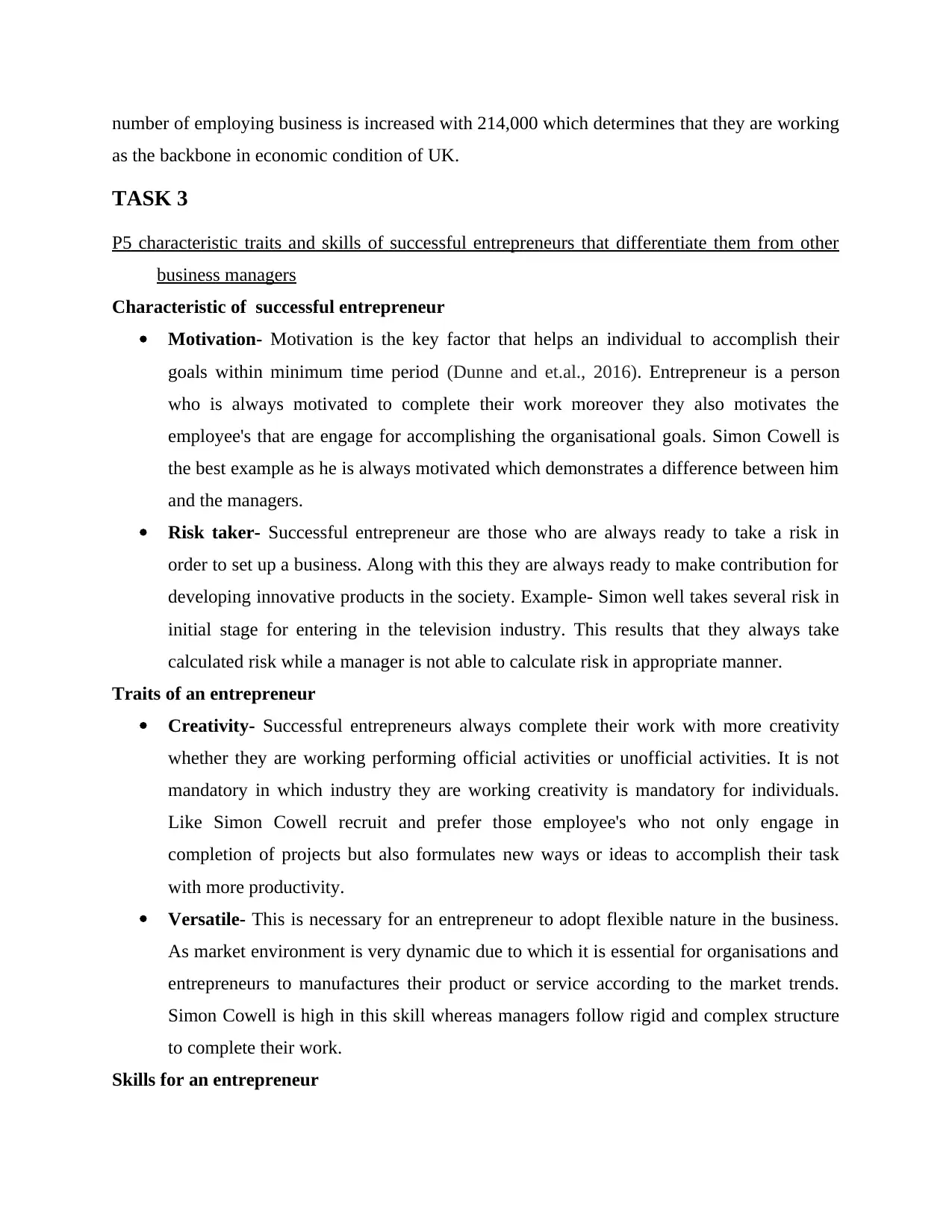
number of employing business is increased with 214,000 which determines that they are working
as the backbone in economic condition of UK.
TASK 3
P5 characteristic traits and skills of successful entrepreneurs that differentiate them from other
business managers
Characteristic of successful entrepreneur
Motivation- Motivation is the key factor that helps an individual to accomplish their
goals within minimum time period (Dunne and et.al., 2016). Entrepreneur is a person
who is always motivated to complete their work moreover they also motivates the
employee's that are engage for accomplishing the organisational goals. Simon Cowell is
the best example as he is always motivated which demonstrates a difference between him
and the managers.
Risk taker- Successful entrepreneur are those who are always ready to take a risk in
order to set up a business. Along with this they are always ready to make contribution for
developing innovative products in the society. Example- Simon well takes several risk in
initial stage for entering in the television industry. This results that they always take
calculated risk while a manager is not able to calculate risk in appropriate manner.
Traits of an entrepreneur
Creativity- Successful entrepreneurs always complete their work with more creativity
whether they are working performing official activities or unofficial activities. It is not
mandatory in which industry they are working creativity is mandatory for individuals.
Like Simon Cowell recruit and prefer those employee's who not only engage in
completion of projects but also formulates new ways or ideas to accomplish their task
with more productivity.
Versatile- This is necessary for an entrepreneur to adopt flexible nature in the business.
As market environment is very dynamic due to which it is essential for organisations and
entrepreneurs to manufactures their product or service according to the market trends.
Simon Cowell is high in this skill whereas managers follow rigid and complex structure
to complete their work.
Skills for an entrepreneur
as the backbone in economic condition of UK.
TASK 3
P5 characteristic traits and skills of successful entrepreneurs that differentiate them from other
business managers
Characteristic of successful entrepreneur
Motivation- Motivation is the key factor that helps an individual to accomplish their
goals within minimum time period (Dunne and et.al., 2016). Entrepreneur is a person
who is always motivated to complete their work moreover they also motivates the
employee's that are engage for accomplishing the organisational goals. Simon Cowell is
the best example as he is always motivated which demonstrates a difference between him
and the managers.
Risk taker- Successful entrepreneur are those who are always ready to take a risk in
order to set up a business. Along with this they are always ready to make contribution for
developing innovative products in the society. Example- Simon well takes several risk in
initial stage for entering in the television industry. This results that they always take
calculated risk while a manager is not able to calculate risk in appropriate manner.
Traits of an entrepreneur
Creativity- Successful entrepreneurs always complete their work with more creativity
whether they are working performing official activities or unofficial activities. It is not
mandatory in which industry they are working creativity is mandatory for individuals.
Like Simon Cowell recruit and prefer those employee's who not only engage in
completion of projects but also formulates new ways or ideas to accomplish their task
with more productivity.
Versatile- This is necessary for an entrepreneur to adopt flexible nature in the business.
As market environment is very dynamic due to which it is essential for organisations and
entrepreneurs to manufactures their product or service according to the market trends.
Simon Cowell is high in this skill whereas managers follow rigid and complex structure
to complete their work.
Skills for an entrepreneur
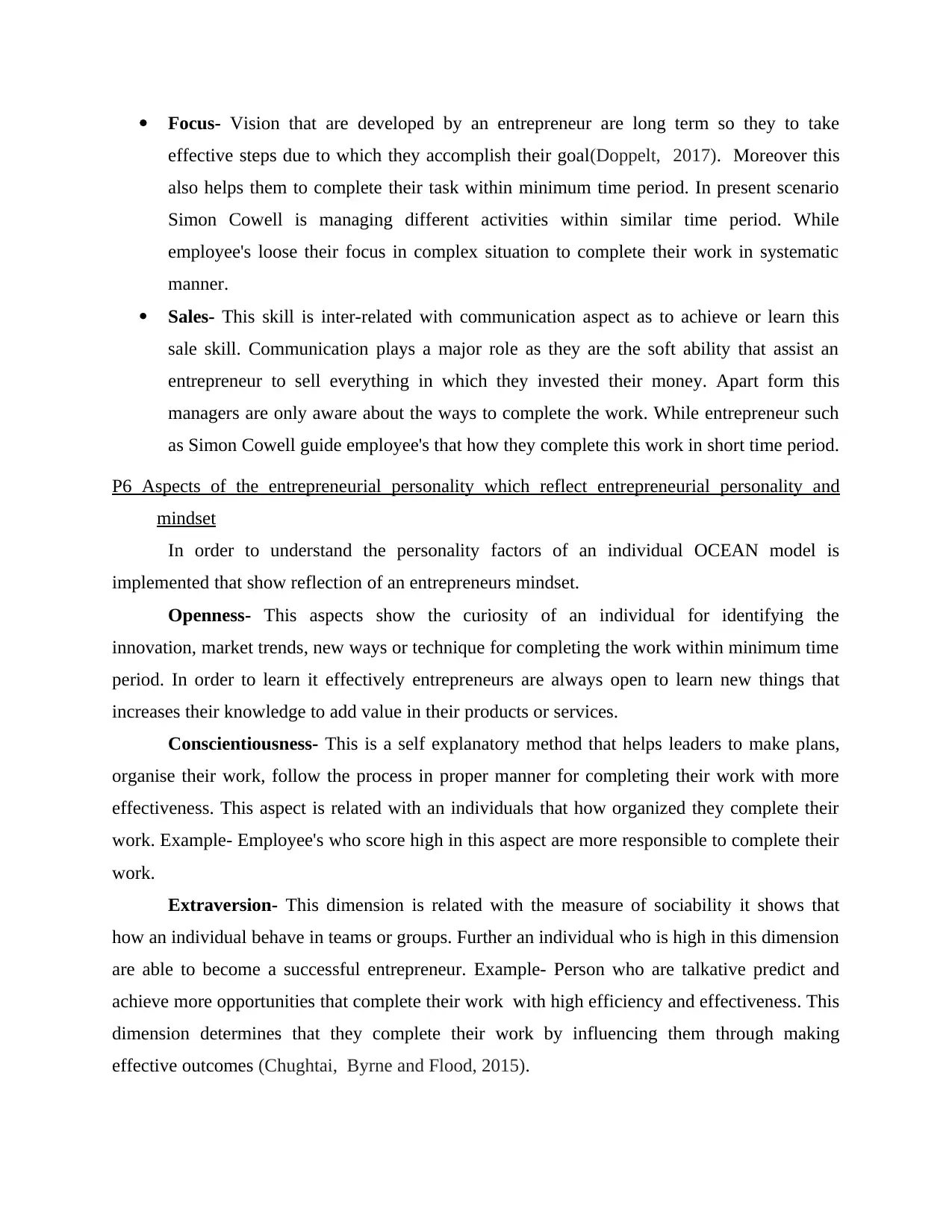
Focus- Vision that are developed by an entrepreneur are long term so they to take
effective steps due to which they accomplish their goal(Doppelt, 2017). Moreover this
also helps them to complete their task within minimum time period. In present scenario
Simon Cowell is managing different activities within similar time period. While
employee's loose their focus in complex situation to complete their work in systematic
manner.
Sales- This skill is inter-related with communication aspect as to achieve or learn this
sale skill. Communication plays a major role as they are the soft ability that assist an
entrepreneur to sell everything in which they invested their money. Apart form this
managers are only aware about the ways to complete the work. While entrepreneur such
as Simon Cowell guide employee's that how they complete this work in short time period.
P6 Aspects of the entrepreneurial personality which reflect entrepreneurial personality and
mindset
In order to understand the personality factors of an individual OCEAN model is
implemented that show reflection of an entrepreneurs mindset.
Openness- This aspects show the curiosity of an individual for identifying the
innovation, market trends, new ways or technique for completing the work within minimum time
period. In order to learn it effectively entrepreneurs are always open to learn new things that
increases their knowledge to add value in their products or services.
Conscientiousness- This is a self explanatory method that helps leaders to make plans,
organise their work, follow the process in proper manner for completing their work with more
effectiveness. This aspect is related with an individuals that how organized they complete their
work. Example- Employee's who score high in this aspect are more responsible to complete their
work.
Extraversion- This dimension is related with the measure of sociability it shows that
how an individual behave in teams or groups. Further an individual who is high in this dimension
are able to become a successful entrepreneur. Example- Person who are talkative predict and
achieve more opportunities that complete their work with high efficiency and effectiveness. This
dimension determines that they complete their work by influencing them through making
effective outcomes (Chughtai, Byrne and Flood, 2015).
effective steps due to which they accomplish their goal(Doppelt, 2017). Moreover this
also helps them to complete their task within minimum time period. In present scenario
Simon Cowell is managing different activities within similar time period. While
employee's loose their focus in complex situation to complete their work in systematic
manner.
Sales- This skill is inter-related with communication aspect as to achieve or learn this
sale skill. Communication plays a major role as they are the soft ability that assist an
entrepreneur to sell everything in which they invested their money. Apart form this
managers are only aware about the ways to complete the work. While entrepreneur such
as Simon Cowell guide employee's that how they complete this work in short time period.
P6 Aspects of the entrepreneurial personality which reflect entrepreneurial personality and
mindset
In order to understand the personality factors of an individual OCEAN model is
implemented that show reflection of an entrepreneurs mindset.
Openness- This aspects show the curiosity of an individual for identifying the
innovation, market trends, new ways or technique for completing the work within minimum time
period. In order to learn it effectively entrepreneurs are always open to learn new things that
increases their knowledge to add value in their products or services.
Conscientiousness- This is a self explanatory method that helps leaders to make plans,
organise their work, follow the process in proper manner for completing their work with more
effectiveness. This aspect is related with an individuals that how organized they complete their
work. Example- Employee's who score high in this aspect are more responsible to complete their
work.
Extraversion- This dimension is related with the measure of sociability it shows that
how an individual behave in teams or groups. Further an individual who is high in this dimension
are able to become a successful entrepreneur. Example- Person who are talkative predict and
achieve more opportunities that complete their work with high efficiency and effectiveness. This
dimension determines that they complete their work by influencing them through making
effective outcomes (Chughtai, Byrne and Flood, 2015).
⊘ This is a preview!⊘
Do you want full access?
Subscribe today to unlock all pages.

Trusted by 1+ million students worldwide
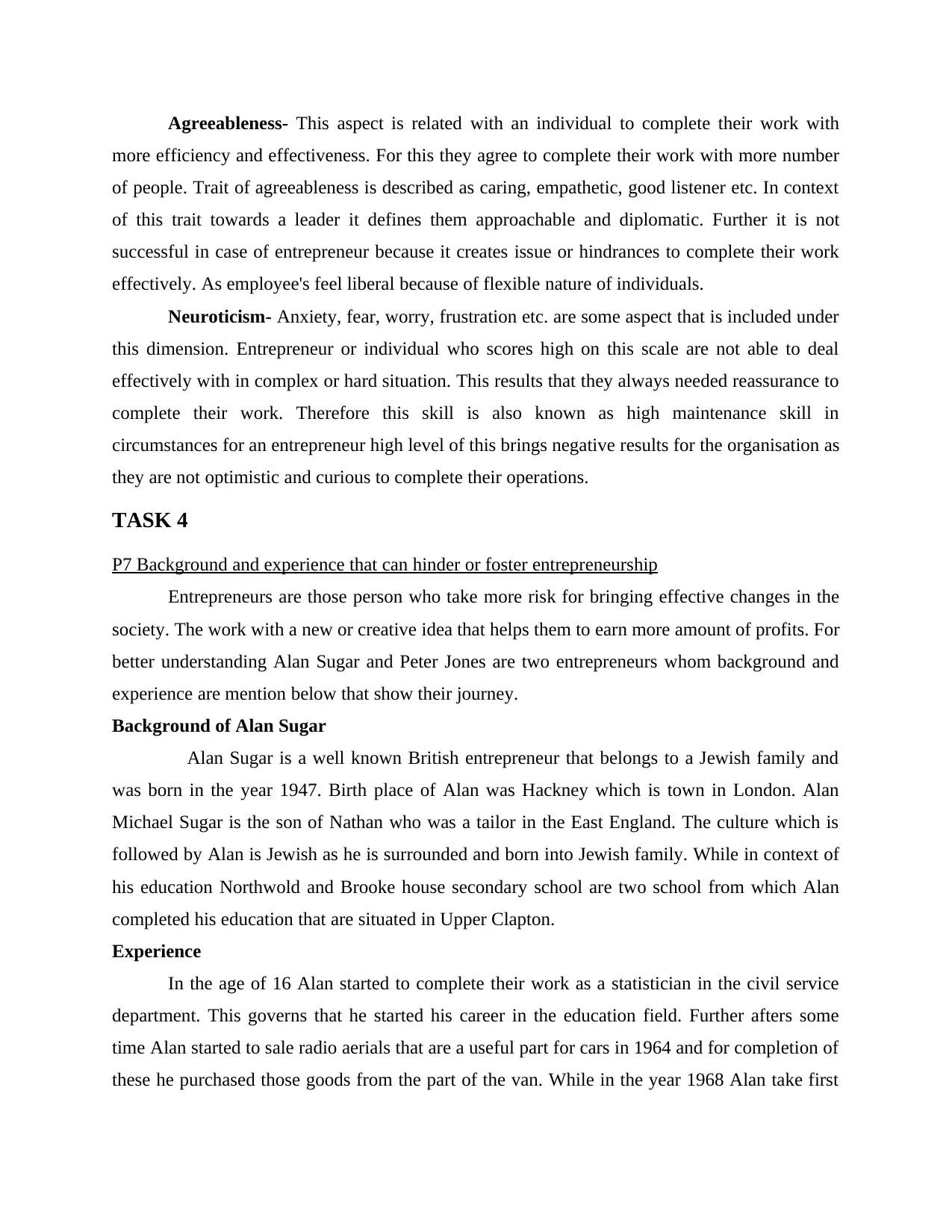
Agreeableness- This aspect is related with an individual to complete their work with
more efficiency and effectiveness. For this they agree to complete their work with more number
of people. Trait of agreeableness is described as caring, empathetic, good listener etc. In context
of this trait towards a leader it defines them approachable and diplomatic. Further it is not
successful in case of entrepreneur because it creates issue or hindrances to complete their work
effectively. As employee's feel liberal because of flexible nature of individuals.
Neuroticism- Anxiety, fear, worry, frustration etc. are some aspect that is included under
this dimension. Entrepreneur or individual who scores high on this scale are not able to deal
effectively with in complex or hard situation. This results that they always needed reassurance to
complete their work. Therefore this skill is also known as high maintenance skill in
circumstances for an entrepreneur high level of this brings negative results for the organisation as
they are not optimistic and curious to complete their operations.
TASK 4
P7 Background and experience that can hinder or foster entrepreneurship
Entrepreneurs are those person who take more risk for bringing effective changes in the
society. The work with a new or creative idea that helps them to earn more amount of profits. For
better understanding Alan Sugar and Peter Jones are two entrepreneurs whom background and
experience are mention below that show their journey.
Background of Alan Sugar
Alan Sugar is a well known British entrepreneur that belongs to a Jewish family and
was born in the year 1947. Birth place of Alan was Hackney which is town in London. Alan
Michael Sugar is the son of Nathan who was a tailor in the East England. The culture which is
followed by Alan is Jewish as he is surrounded and born into Jewish family. While in context of
his education Northwold and Brooke house secondary school are two school from which Alan
completed his education that are situated in Upper Clapton.
Experience
In the age of 16 Alan started to complete their work as a statistician in the civil service
department. This governs that he started his career in the education field. Further afters some
time Alan started to sale radio aerials that are a useful part for cars in 1964 and for completion of
these he purchased those goods from the part of the van. While in the year 1968 Alan take first
more efficiency and effectiveness. For this they agree to complete their work with more number
of people. Trait of agreeableness is described as caring, empathetic, good listener etc. In context
of this trait towards a leader it defines them approachable and diplomatic. Further it is not
successful in case of entrepreneur because it creates issue or hindrances to complete their work
effectively. As employee's feel liberal because of flexible nature of individuals.
Neuroticism- Anxiety, fear, worry, frustration etc. are some aspect that is included under
this dimension. Entrepreneur or individual who scores high on this scale are not able to deal
effectively with in complex or hard situation. This results that they always needed reassurance to
complete their work. Therefore this skill is also known as high maintenance skill in
circumstances for an entrepreneur high level of this brings negative results for the organisation as
they are not optimistic and curious to complete their operations.
TASK 4
P7 Background and experience that can hinder or foster entrepreneurship
Entrepreneurs are those person who take more risk for bringing effective changes in the
society. The work with a new or creative idea that helps them to earn more amount of profits. For
better understanding Alan Sugar and Peter Jones are two entrepreneurs whom background and
experience are mention below that show their journey.
Background of Alan Sugar
Alan Sugar is a well known British entrepreneur that belongs to a Jewish family and
was born in the year 1947. Birth place of Alan was Hackney which is town in London. Alan
Michael Sugar is the son of Nathan who was a tailor in the East England. The culture which is
followed by Alan is Jewish as he is surrounded and born into Jewish family. While in context of
his education Northwold and Brooke house secondary school are two school from which Alan
completed his education that are situated in Upper Clapton.
Experience
In the age of 16 Alan started to complete their work as a statistician in the civil service
department. This governs that he started his career in the education field. Further afters some
time Alan started to sale radio aerials that are a useful part for cars in 1964 and for completion of
these he purchased those goods from the part of the van. While in the year 1968 Alan take first
Paraphrase This Document
Need a fresh take? Get an instant paraphrase of this document with our AI Paraphraser
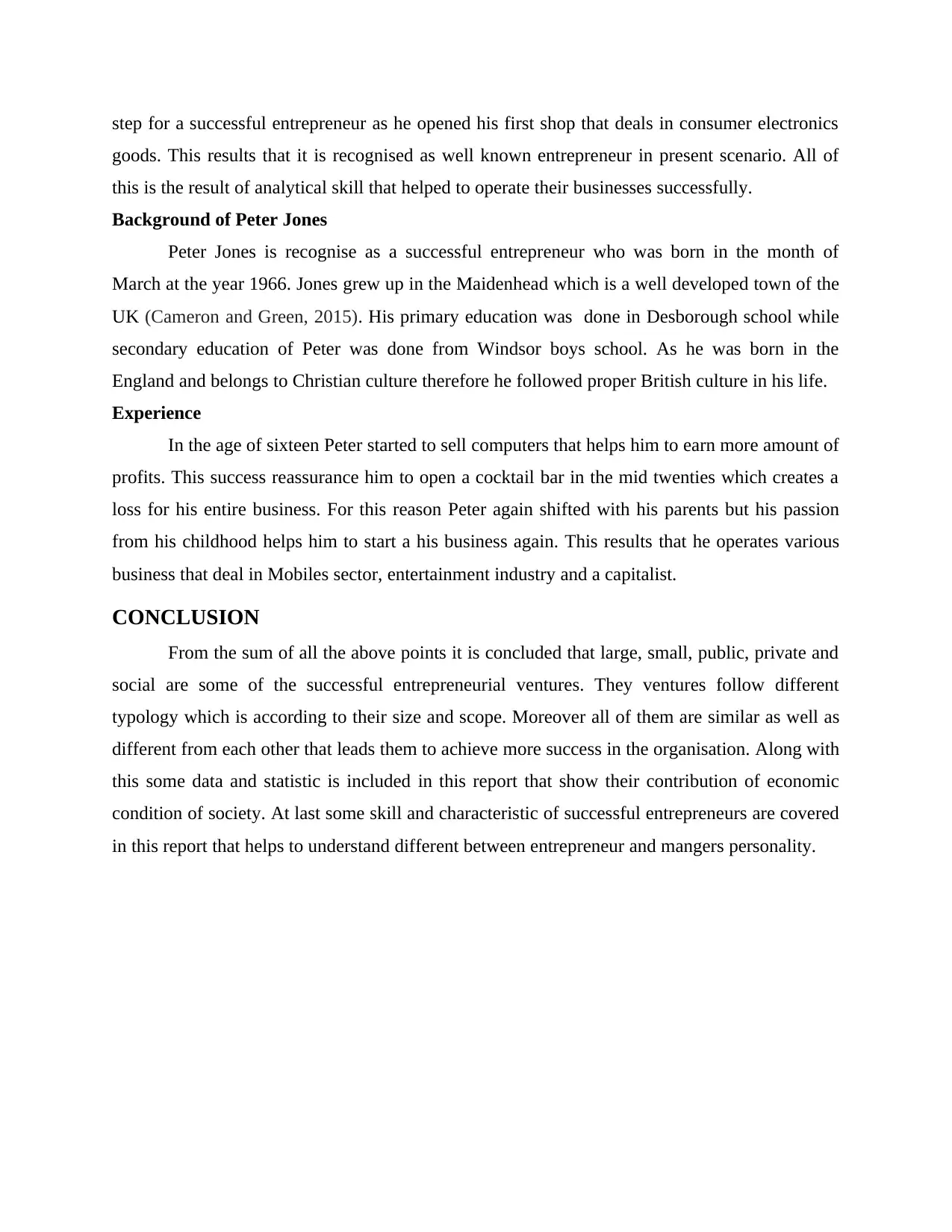
step for a successful entrepreneur as he opened his first shop that deals in consumer electronics
goods. This results that it is recognised as well known entrepreneur in present scenario. All of
this is the result of analytical skill that helped to operate their businesses successfully.
Background of Peter Jones
Peter Jones is recognise as a successful entrepreneur who was born in the month of
March at the year 1966. Jones grew up in the Maidenhead which is a well developed town of the
UK (Cameron and Green, 2015). His primary education was done in Desborough school while
secondary education of Peter was done from Windsor boys school. As he was born in the
England and belongs to Christian culture therefore he followed proper British culture in his life.
Experience
In the age of sixteen Peter started to sell computers that helps him to earn more amount of
profits. This success reassurance him to open a cocktail bar in the mid twenties which creates a
loss for his entire business. For this reason Peter again shifted with his parents but his passion
from his childhood helps him to start a his business again. This results that he operates various
business that deal in Mobiles sector, entertainment industry and a capitalist.
CONCLUSION
From the sum of all the above points it is concluded that large, small, public, private and
social are some of the successful entrepreneurial ventures. They ventures follow different
typology which is according to their size and scope. Moreover all of them are similar as well as
different from each other that leads them to achieve more success in the organisation. Along with
this some data and statistic is included in this report that show their contribution of economic
condition of society. At last some skill and characteristic of successful entrepreneurs are covered
in this report that helps to understand different between entrepreneur and mangers personality.
goods. This results that it is recognised as well known entrepreneur in present scenario. All of
this is the result of analytical skill that helped to operate their businesses successfully.
Background of Peter Jones
Peter Jones is recognise as a successful entrepreneur who was born in the month of
March at the year 1966. Jones grew up in the Maidenhead which is a well developed town of the
UK (Cameron and Green, 2015). His primary education was done in Desborough school while
secondary education of Peter was done from Windsor boys school. As he was born in the
England and belongs to Christian culture therefore he followed proper British culture in his life.
Experience
In the age of sixteen Peter started to sell computers that helps him to earn more amount of
profits. This success reassurance him to open a cocktail bar in the mid twenties which creates a
loss for his entire business. For this reason Peter again shifted with his parents but his passion
from his childhood helps him to start a his business again. This results that he operates various
business that deal in Mobiles sector, entertainment industry and a capitalist.
CONCLUSION
From the sum of all the above points it is concluded that large, small, public, private and
social are some of the successful entrepreneurial ventures. They ventures follow different
typology which is according to their size and scope. Moreover all of them are similar as well as
different from each other that leads them to achieve more success in the organisation. Along with
this some data and statistic is included in this report that show their contribution of economic
condition of society. At last some skill and characteristic of successful entrepreneurs are covered
in this report that helps to understand different between entrepreneur and mangers personality.
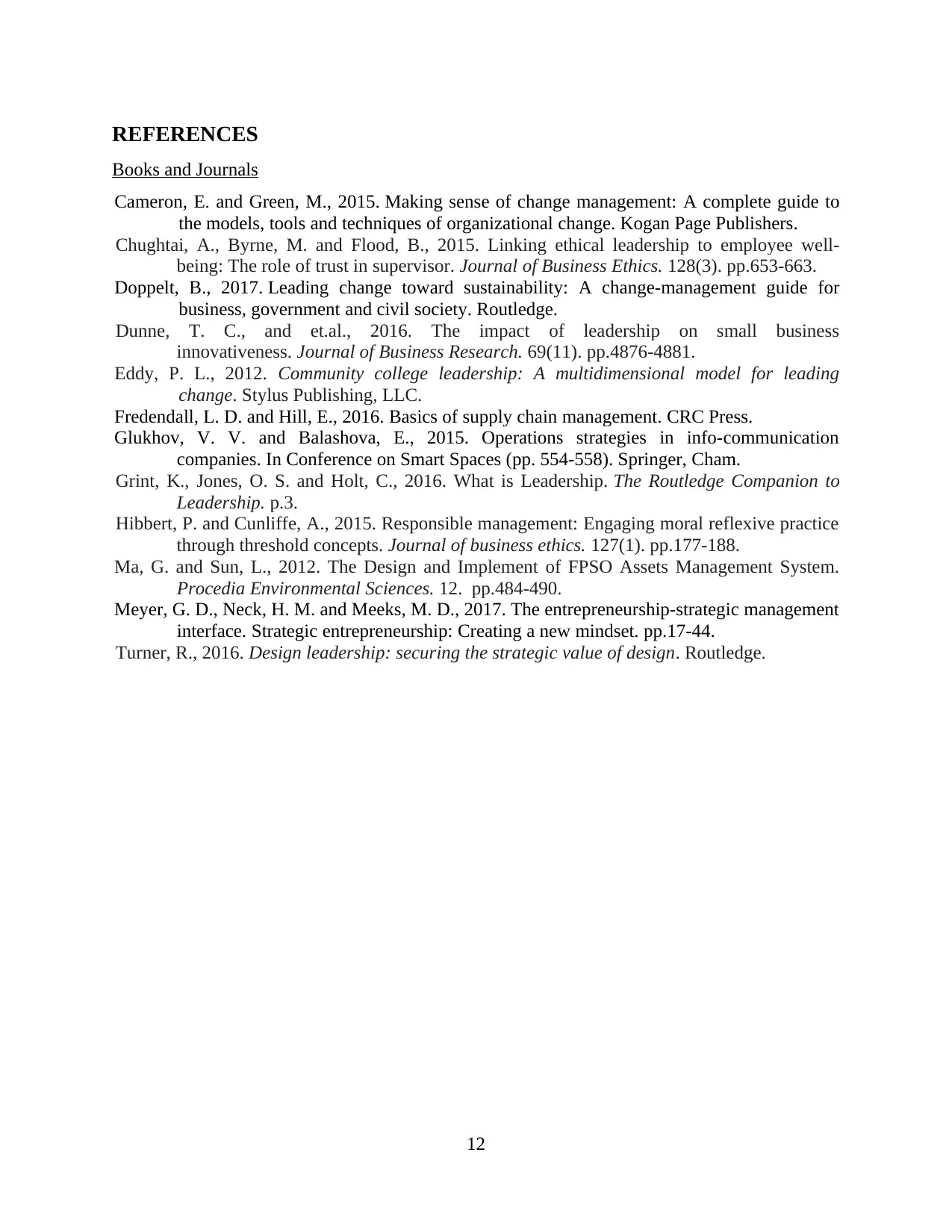
REFERENCES
Books and Journals
Cameron, E. and Green, M., 2015. Making sense of change management: A complete guide to
the models, tools and techniques of organizational change. Kogan Page Publishers.
Chughtai, A., Byrne, M. and Flood, B., 2015. Linking ethical leadership to employee well-
being: The role of trust in supervisor. Journal of Business Ethics. 128(3). pp.653-663.
Doppelt, B., 2017. Leading change toward sustainability: A change-management guide for
business, government and civil society. Routledge.
Dunne, T. C., and et.al., 2016. The impact of leadership on small business
innovativeness. Journal of Business Research. 69(11). pp.4876-4881.
Eddy, P. L., 2012. Community college leadership: A multidimensional model for leading
change. Stylus Publishing, LLC.
Fredendall, L. D. and Hill, E., 2016. Basics of supply chain management. CRC Press.
Glukhov, V. V. and Balashova, E., 2015. Operations strategies in info-communication
companies. In Conference on Smart Spaces (pp. 554-558). Springer, Cham.
Grint, K., Jones, O. S. and Holt, C., 2016. What is Leadership. The Routledge Companion to
Leadership. p.3.
Hibbert, P. and Cunliffe, A., 2015. Responsible management: Engaging moral reflexive practice
through threshold concepts. Journal of business ethics. 127(1). pp.177-188.
Ma, G. and Sun, L., 2012. The Design and Implement of FPSO Assets Management System.
Procedia Environmental Sciences. 12. pp.484-490.
Meyer, G. D., Neck, H. M. and Meeks, M. D., 2017. The entrepreneurship‐strategic management
interface. Strategic entrepreneurship: Creating a new mindset. pp.17-44.
Turner, R., 2016. Design leadership: securing the strategic value of design. Routledge.
12
Books and Journals
Cameron, E. and Green, M., 2015. Making sense of change management: A complete guide to
the models, tools and techniques of organizational change. Kogan Page Publishers.
Chughtai, A., Byrne, M. and Flood, B., 2015. Linking ethical leadership to employee well-
being: The role of trust in supervisor. Journal of Business Ethics. 128(3). pp.653-663.
Doppelt, B., 2017. Leading change toward sustainability: A change-management guide for
business, government and civil society. Routledge.
Dunne, T. C., and et.al., 2016. The impact of leadership on small business
innovativeness. Journal of Business Research. 69(11). pp.4876-4881.
Eddy, P. L., 2012. Community college leadership: A multidimensional model for leading
change. Stylus Publishing, LLC.
Fredendall, L. D. and Hill, E., 2016. Basics of supply chain management. CRC Press.
Glukhov, V. V. and Balashova, E., 2015. Operations strategies in info-communication
companies. In Conference on Smart Spaces (pp. 554-558). Springer, Cham.
Grint, K., Jones, O. S. and Holt, C., 2016. What is Leadership. The Routledge Companion to
Leadership. p.3.
Hibbert, P. and Cunliffe, A., 2015. Responsible management: Engaging moral reflexive practice
through threshold concepts. Journal of business ethics. 127(1). pp.177-188.
Ma, G. and Sun, L., 2012. The Design and Implement of FPSO Assets Management System.
Procedia Environmental Sciences. 12. pp.484-490.
Meyer, G. D., Neck, H. M. and Meeks, M. D., 2017. The entrepreneurship‐strategic management
interface. Strategic entrepreneurship: Creating a new mindset. pp.17-44.
Turner, R., 2016. Design leadership: securing the strategic value of design. Routledge.
12
⊘ This is a preview!⊘
Do you want full access?
Subscribe today to unlock all pages.

Trusted by 1+ million students worldwide
1 out of 12
Related Documents
Your All-in-One AI-Powered Toolkit for Academic Success.
+13062052269
info@desklib.com
Available 24*7 on WhatsApp / Email
![[object Object]](/_next/static/media/star-bottom.7253800d.svg)
Unlock your academic potential
Copyright © 2020–2026 A2Z Services. All Rights Reserved. Developed and managed by ZUCOL.



